How Body Confidence Impacts Everyday Life
We all have things we’d like to change about our appearance. You’d have a hard time finding someone who’s only ever had positive thoughts about their body. Add this to the constant shaping of our body image by the media, influencers, strangers and friends and it’s bound to affect how we see ourselves. Wanting to understand the real impact a person’s body confidence can have on other areas of their life – whether it’s in everyday chats, getting ahead in their jobs or their relationships – we worked with OnePoll to survey 2,000 UK residents about the topic. Here’s what we found.
Body confidence in the UK
To start, we looked at body confidence as a whole across the UK, comparing general feelings towards body image across gender, age and location.
Age
Body worries are felt by all age groups, with the 35-44s having the lowest body confidence. Interestingly, the age group just above them – the over 55s – had the highest body confidence. Digging deeper into the in-depth answers revealed that this was because of a shift in mentality and learning to accept the things you cannot change. This was confirmed by one respondent who said their new-found confidence came down to ‘getting older and simply not caring’.
Location
People living in major cities – like London, Manchester and Birmingham – tend to be less confident about their bodies than people living in smaller cities like Leicester and Norwich. This could partially be because of how much more outdoor advertising city dwellers see on a day-to-day basis as well as the added stress living a fast-paced urban lifestyle brings. Higher stress levels can make it harder to stay positive about other things like body image.
We also wanted to check if there was a link between location and exercise. All in all, people exercise for just over three hours each week, with Londoners doing the most exercise, followed by Edinburgh. Why? It may be that people who live in big cities do more physical activity to protect their mental wellbeing from hectic city living.
Which city is the most body confident?
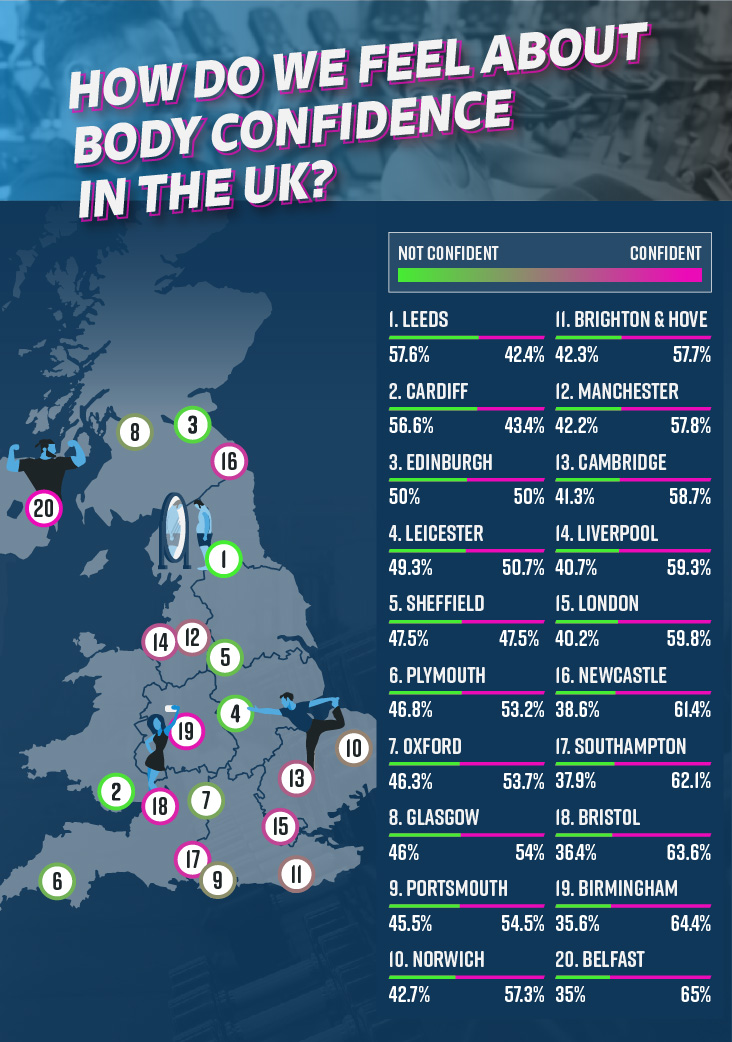
Gender
In general, the women’s group had lower body confidence than men. As women’s body image struggles – and the unrealistically high bar set for them – have been well documented already, this is sadly not news to anyone. What is somewhat surprising is the percentage of men (36%) who are not confident about their bodies.
The pressure to have a ‘superhero’ body type can be spotted less through mass media for men (although celebrities who are considered ‘attractive’ still have a muscular physique) and more through the opinions of friends, teams and social media, which can be seen in the praise men get for having a well-built shape.
What shapes body image?
It’s those closest to us – both physically and digitally – who make us consider how we feel about our bodies the most. Basing our own look on people in the same social group as us is not a new phenomenon, but it’s the constant stream of washboard abs, bulging biceps, lustrous hair and smooth skin available on our phones that have set a worryingly high point of reference. Social media has taken particular hold of the impressionable 18-24-year-olds, with the highest percentage (35%) admitting it has the biggest impact on their body confidence.
What causes body confidence to fluctuate?
Body confidence is not a static feeling. There are so many internal and external factors at play that our outlook can shift from low to high, on a sometimes daily basis. Physical change – like fluctuations in weight – makes the greatest impression on body confidence, for more women than men. Whereas men are more motivated by exercise and achieving social media validation. “I put a lot of weight on due to side effects from medication,” one survey respondent told us.“I went from 9 stone to almost 11 stone very quickly. I didn’t even pack a swimming outfit when I next went on a holiday and I had to go out to buy bigger clothes.”
Receiving compliments caused the youngest age group’s body-based mood to flip positively more than anything else, with 32% of 18-24s appreciating praise about how they look the most.
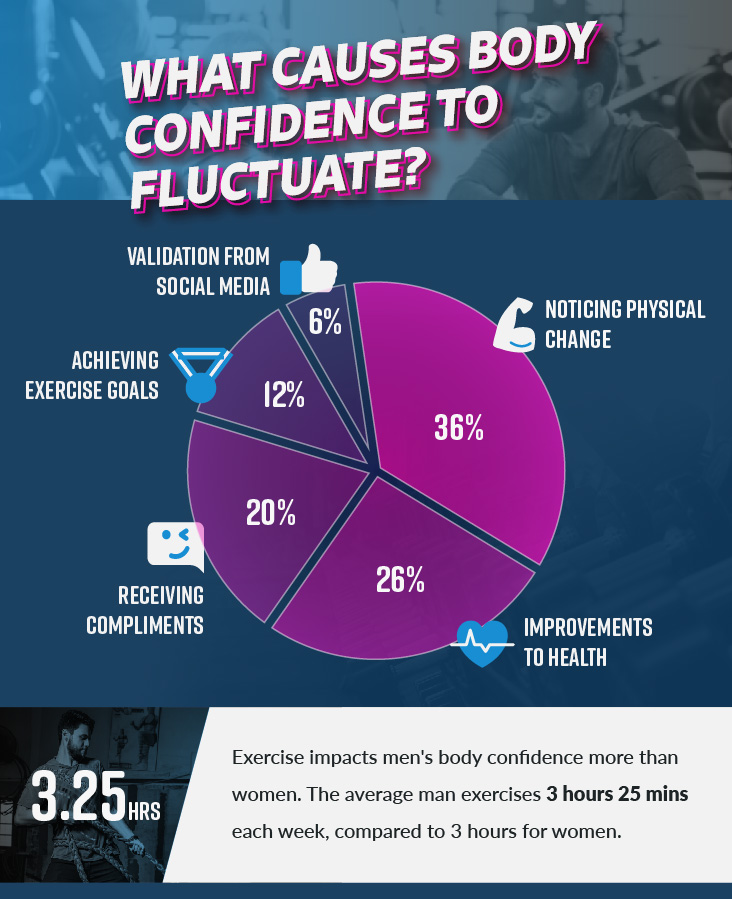
The impact of low body confidence
We know the causes of low body confidence and that these can change, but do these feelings ever hold us back from going about our daily lives? Are we missing out on experiences purely because of our lack of self-assurance? For our respondents, yes. Their answers hammered home how different each gender’s attitude is towards their size. Body image issues are more damaging to women’s mental health, but more men say that low body confidence has stalled their progression at work.
Across the board, it’s our love lives that take the biggest hit, with many respondents admitting that they have decided not to go on a date because their body confidence prevented them.
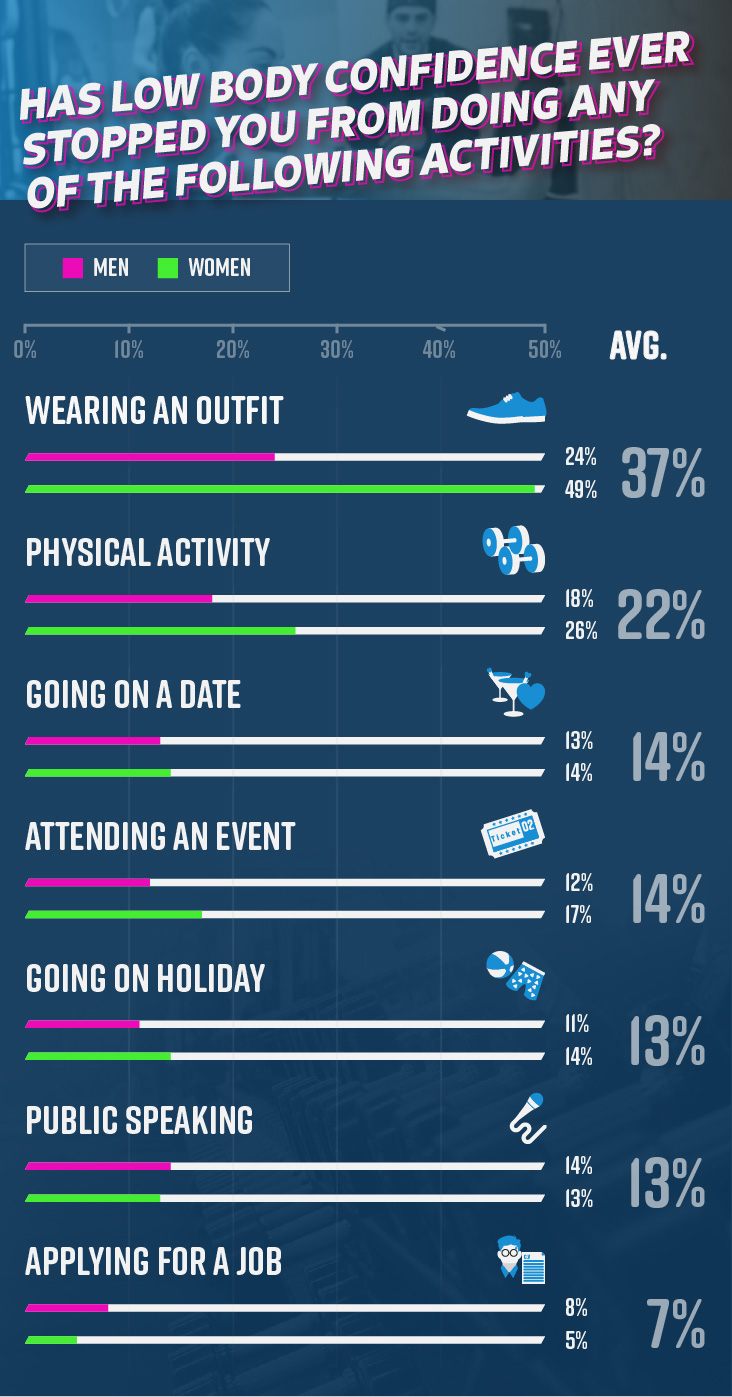
For 18-24-year-olds, low body confidence takes its toll on their mental health more than any other aspect of their lives:
• Mental health (57%)
• Love live (54%)
• Social life (52%)
• Career progression (35%)
Almost 50% of women say that low body confidence has affected what they wear. A common thread was found with many saying the thought of going to the beach or a swimming pool – and having to wear a revealing outfit – gave them anxiety.
Improving your body confidence
Unfortunately, there’s no magic solution that will instantly improve body confidence. Nevertheless, there are always things we can put in place to combat confidence issues, so we spoke to some body confidence influencers to share some of their actionable tips:
Shift your focus
Think about daily habits you do that spark negativity then rearrange them into something positive. This could mean removing that behaviour from your routine altogether and replacing it or changing something specific to make it more constructive. For many, this habit is social media. If the idea of giving up social media full stop fills you with dread, it’s time for an overhaul. Unfollow anyone that makes you feel bad about yourself and begin to follow pages that empower you and reinforce a positive body image.
Radio presenter and body confidence advocate, Tom Green, discussed his concerns about social media’s effect on mental wellbeing, and agrees that it is all about who you choose to follow and the community you curate. He said:
“Peoples ‘reality’, their ‘norms’ and understanding of what is right and wrong is built from what they consume around them.
And more and more these days that reality is constructed through social media. A reality which is completely distorted and does not represent truth. It’s edited, adjusted, photoshopped and contorted.
People track their lives on likes and posts and comments... which it’s disastrous. I think this has a massive effect on people’s mental health and their internal barometer of ‘worth’.”
Stay fit and healthy
It’s often assumed that if you attend the gym regularly and eat nutritious food you’re aiming to look a certain way, but a healthy lifestyle has benefits way beyond aesthetics. Doing regular activities, whether that’s through a solo gym session, swimming lengths or group classes, enhances your mood and is encouraged to improve your quality of life, while eating healthily takes care of feeling good from the inside.
David James Seed, model and fashion influencer, is an advocate of this advice, saying: “By getting in shape and becoming healthy for me and me alone, I felt great in myself. I figured, ‘I have one body, I might as well make it the best it can be!’ and, to be honest, that was the best way to combat my insecurities.”
Do what makes you feel good
It’s easy to get so caught in a rut of routine that making time to treat yourself get put on the back-burner. Make a list of the things you enjoy doing, like spending time with friends, doing a particular hobby or pampering yourself and allow time each week for them in your schedule.
Tom Green encourages the feel-good approach, by ensuring you do things that make you happy and comfortable, saying:
“Do what makes you happy and be comfortable in knowing what you are is enough. Confidence in all aspects comes from being comfortable, and that will only happen once you understand yourself and don’t judge your actions against those of other people.”
Speak out
Daren Pritchard, an LGBTQ+ rights and male body image disorder activist, encourages those less confident to share how they’re feeling: ‘If you’re struggling, talk to someone. Men traditionally find it hard to talk about their mental health, but it rarely goes away unless you seek help. It’s not a sign of weakness, it’s a sign of strength.’
You may also like
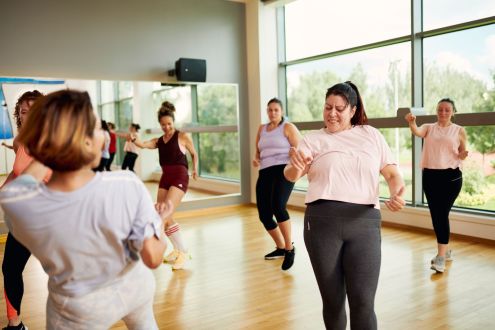
Feet up with friends
Re-energise your social life and bring it to Better. Find a fitness class that suits you.
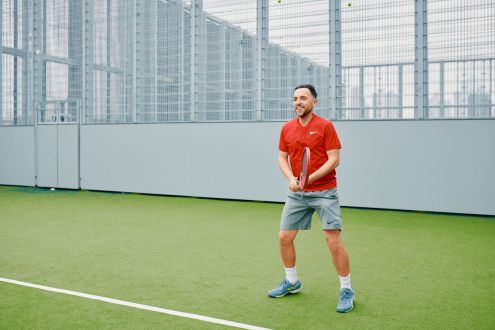
Serve up a winner
Train, learn and play tennis at your local Better centre. Make it a winning season.





